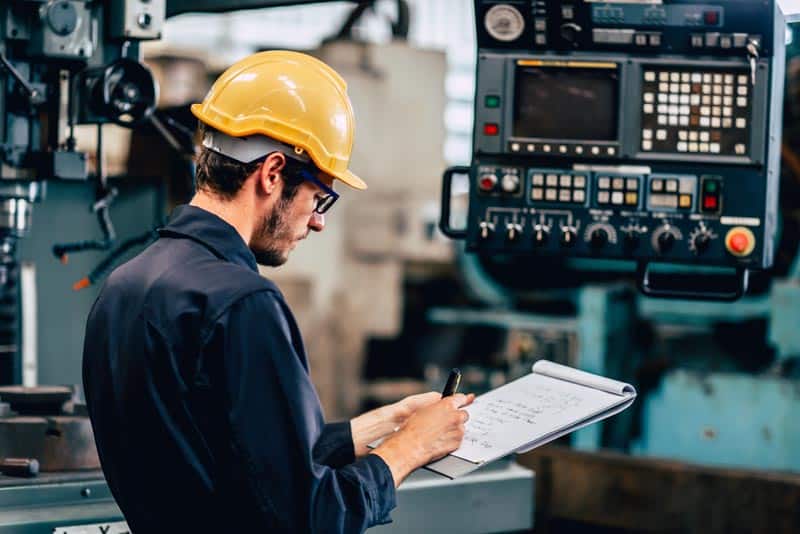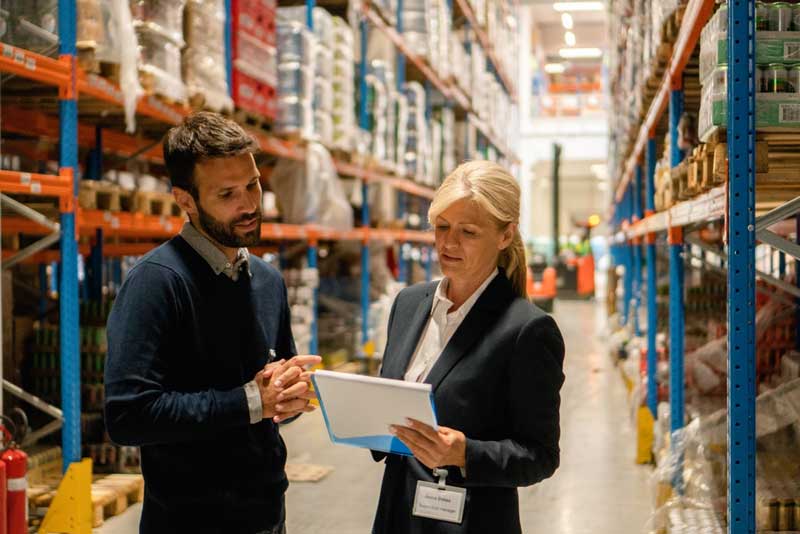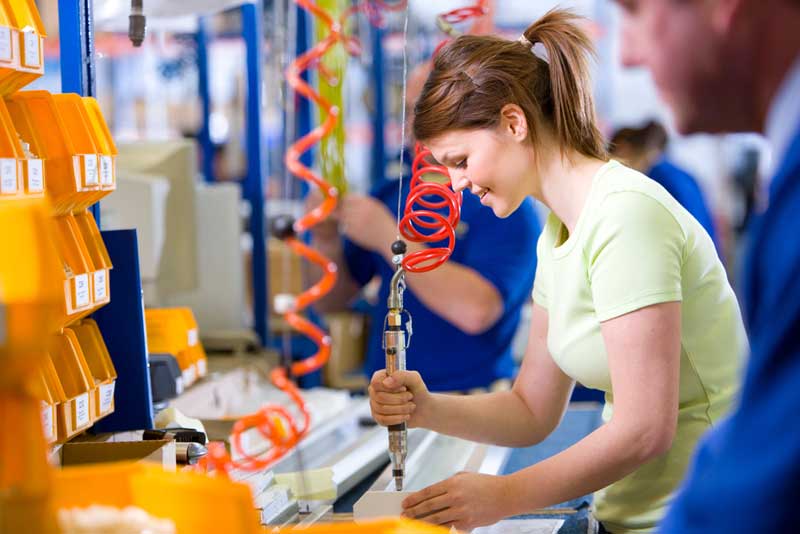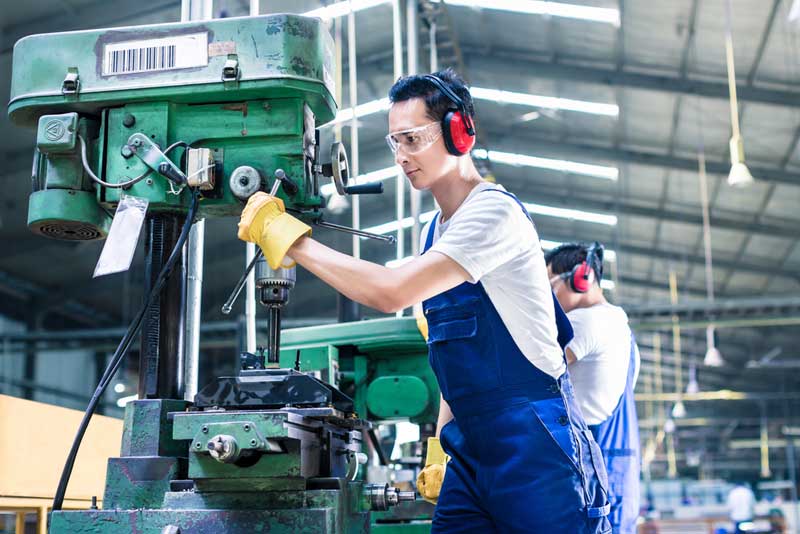America’s factories have long been the backbone of our economy, providing millions of jobs and helping create products sold worldwide. According to the Bureau of Labor Statistics, the outlook for jobs is good, as manufacturing industries are expected to grow in the coming years!
Working in a Factory
Many people consider factory work a viable option when it comes to a steady career. Employees often receive reliable schedules and benefits in a factory setting, such as healthcare and retirement plans. Additionally, factory work can provide growth opportunities for those looking to advance their skills and move up the company ladder. Moreover, factories play a crucial role in our economy by producing essential products for society and providing job stability and security for workers. Overall, working in a factory can offer numerous benefits and be a viable option for those seeking steady employment.
Factory workers usually are at least 18 years old and have a high school diploma or equivalent. They typically start earning minimum wage, but with experience and training, factory workers can make more. A skilled professional with years of experience in the manufacturing industry, factory workers are responsible for ensuring that production runs smoothly and meet quality standards. They operate machines at their work sites to feed material into them while monitoring what’s going on around it all along – making sure everything meets your needs!
The factory worker is an integral part of the manufacturing process. They are employed by a number of industries, and their tasks will vary depending on what they produce; but one thing remains constant – continuous production with shift work available for those who need it!
Looking for Factory Workers?
When looking for employees, factories generally look for physically fit individuals who can lift heavy objects, work with the equipment, and stand on their feet for extended periods. They also prefer individuals with great attention to detail and the ability to follow instructions accurately. Basic math skills are also often required as well as the ability to work well in a team environment. While having prior experience in a factory setting is helpful, many factories offer training programs for new hires. Some factories may have requirements specific to their industry or worker safety regulations.
What Types of Jobs are Available in Factories
Factory workers each have their specific duties and responsibilities. The most common factory worker roles include:
- Factory Assemblers
- Machine Operators
- Quality Control Inspectors
- Maintenance Workers
- Production Supervisors
Factory Assemblers
Assemblers are factory workers who assemble products or components. They typically work in manufacturing and production environments and use tools, machines, and their hands to assemble products. Factory assemblers usually receive on-the-job training, lasting from a few days to several months. Once an assembler has completed their training, they typically work full-time and may work overtime or weekends if necessary.

Machine Operators
Operators run the machines that produce the products. Operating a factory machine requires knowledge of how the particular machine works and an understanding of safety procedures. Machine operators must be able to follow instructions carefully and be able to troubleshoot any problems that may arise. They typically work in shifts, so it is important that they be able to work well both independently and as part of a team working on a particular piece of equipment.
Most workers will need to complete on-the-job training to become factory machine operators. Some factory machine operators may also pursue formal education or certification to improve their chances of securing a job or advancing their careers.
Quality Control Inspectors
Quality control inspectors check products coming off the factory floor to ensure they meet quality standards. If they find a defective product, they may need to rework or scrap it. Sometimes, they may also be responsible for training other workers in quality control procedures.
Factory quality control inspectors typically have a high school diploma, and many have completed postsecondary training in quality control or a related field. Some employers may require certification from professional organizations, such as the American Society for Quality or the International Organization for Standardization.
Maintenance Workers
Maintenance workers in factories typically perform various tasks, such as repairing and maintaining machinery, cleaning floors and surfaces, and performing general upkeep around the facility. Maintenance workers who work on machinery are responsible for keeping the factory machines running at maximum efficiency. They may perform preventive maintenance on machines to keep them from breaking down or fix machines that have already broken down.
Maintenance staff, such as janitorial factory workers, are responsible for cleaning and maintaining the factory grounds inside and outside the building.
Looking for Production Workers?
Production Supervisors
Production supervisors in factories are responsible for overseeing and coordinating the work of production workers. They may also be involved in planning and scheduling production activities, meeting quality standards, and troubleshooting issues that arise during production. In larger factories, production supervisors may oversee the work of one or multiple production lines or shifts. In smaller factories, they may be responsible for all aspects of production.

Production supervisors typically have several years of experience working in a production environment as production workers, team leaders, or other production-related roles. Many production supervisors also have formal training in management or engineering.
The job of a production supervisor is demanding and can be stressful at times. Production supervisors must be able to work quickly and efficiently under pressure. They must also communicate effectively with workers, managers, and other stakeholders.
Production supervisors must have excellent problem-solving skills. They must be able to identify and resolve issues that arise during production quickly. They must also be able to think critically and develop creative solutions to challenges.
Effective production supervisors are also strong leaders. They must be able to motivate and encourage workers to meet or exceed production goals. They must also be able to build morale and create a positive work environment.
Looking for Warehouse Workers?
Production supervisors must also maintain high safety standards, be familiar with safety regulations, and ensure that workers follow all safety procedures. They must also be quick to identify and correct any potential hazards.
Finally, production supervisors must be forward-thinking. They should always be looking for ways to improve the production process. They may develop and implement new processes or amend existing ones. They may also recommend new equipment or software that could improve productivity.
Handlers
Handlers are an essential part of the factory environment. They help keep the production process flowing by ensuring that materials and products are moved efficiently between different factory areas. Without handlers, factories would grind to a halt very quickly.

There are several types of handler roles in a factory setting. Some handlers will be responsible for loading raw materials onto conveyor belts or machines. Others will be responsible for moving finished products from one area to another or packing them ready for dispatch.
The most important thing for handlers is to work quickly and accurately. Mistakes can be costly in a factory environment, so handlers must pay close attention to what they are doing.
To be a handler in a factory, one must have some basic practical skills, be able to lift heavy objects and be comfortable working in a fast-paced environment. Being able to follow instructions quickly and accurately is also essential.
Shipping and Receiving Clerks
Shipping and receiving clerks track incoming and outgoing shipments of products and supplies. They keep track of inventory, ensure that products are correctly packaged and labeled, load and unload trucks, and keep paperwork organized. Good shipping and receiving clerks help to keep a business running smoothly.
Working as a shipping and receiving clerk can be physically demanding. It often requires lifting heavy boxes and being on your feet for extended periods.
New Openings on the Horizon
Factories added 467,000 jobs in the last 12 months. And factory production in September 2022, was the highest in 14 years according to the Federal Reserve. Although the days of industrial factories dominating the American landscape may not be what it once was, there are still plenty of factory job opportunities. In fact, with the proper training and certification, these positions can provide a stable and fulfilling career path. From assembly line work to operating heavy machinery, factory jobs often involve working as part of a team to produce products efficiently and accurately. And as technology continues to advance in the manufacturing industry, there are more opportunities for specialized positions in fields such as robotics, 3D printing, and computer programming. As companies continue to invest in innovative tech solutions, the future of manufacturing is looking more exciting than ever before.

FAQ’s
What types of people work in factories?
As anyone who has ever worked in a factory can attest, the job is not for the faint of heart. American factory workers put in long hours, often performing physically demanding tasks in challenging environments. Yet despite these obstacles, they are known for their tenacity and dedication to their jobs. The statistics from zippia.com show that this work ethic spans generations and gender lines, with an average age of 38 and a nearly even split between men and women. And the National Association of Manufacturers emphasizes the importance of continuous education, showing that today’s factory workers possess a diverse range of skills beyond just manual labor. These American workers are true examples of grit and determination, powering our country’s manufacturing industry with impressive efficiency and expertise.
What are the roles in a factory?
Factory roles include assemblers, machinists, maintenance workers, production workers and supervisors, QC inspectors, handlers, and shipping and receiving clerks.
What skills do you need to work in a factory?
It takes a special kind of person to thrive in a factory setting. Being dependable and reliable are essential traits for success, as missing work or shirking responsibilities can have serious consequences on the production line. Physical fitness is also important, as most factory jobs involve standing for long periods of time and performing manual labor. Problem-solving skills are crucial, as unexpected issues or malfunctions often arise on the job. And of course, being able to multi-task, take direction, and manage time effectively all contribute to a worker’s success in a high-pressure factory environment. In addition, having computer proficiency, experience with data entry, and basic math skills can be beneficial, as well as prior experience working with or repairing machines. Ultimately, possessing these qualities and skills can set a factory worker on the path to success.
What do factory helpers do?
The factory floor can often be a hectic and busy place, but with the help of factory helpers, production can run smoothly. Acting as another set of hands, they assist production workers in carrying out tasks and supplying materials. They also play an important role in keeping work areas clean and organized, preventing accidents and incidents. In addition, factory helpers may have some technical knowledge and experience, allowing them to assist with machine operation and minor repairs.









